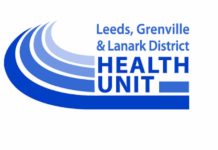Susan Healey, Leeds, Grenville and Lanark District Health Unit
We have had our first individual diagnosed with influenza (flu) in Lanark, Leeds and Grenville and there have been additional people diagnosed in our surrounding area. Flu is circulating in our region. This first flu case has been identified approximately one month earlier than the first case in a typical flu season before COVID-19, which may be an indication of a prolonged and severe flu season this year.
Influenza is a preventable illness that can be very dangerous to some individuals. Because influenza is extremely contagious and is capable of spreading rapidly from person to person, it is important for individuals to follow these steps to protect themselves as well as others in the community: Get a flu shot, wash your hands, use hand sanitizer, keep frequently touched hard surfaces clean and disinfected, cover your cough, and stay home when you are sick.
Influenza vaccination will be very important this fall with the co-circulation of COVID-19 illness, in order to protect personal health as well as mitigate impacts on our healthcare system. The Leeds, Grenville and Lanark District Health Unit recommends annual immunization against influenza for any persons over 6 months of age. There is a new flu vaccine produced each year to protect against the three strains of influenza most commonly circulating during the flu season. Pregnant women are recommended to receive the influenza vaccine. Children who are over the age of 6 months and under the age of nine and are getting the flu shot for the first time should get a second dose one month later.
It takes approximately two weeks for the flu vaccine to reach maximum protection, so be sure to get the vaccine as soon as it is available.
Certain individuals are at a greater risk for serious complications from the flu: Very young children, especially those 2 years of age and younger; pregnant women; people over 65; and adults and children with chronic health conditions such as diabetes, respiratory, cardiac, kidney disease or cancer.
The flu shot is the safest way to protect yourself and your family and friends from the influenza virus. The vaccine protects about 70 percent of people who get a flu shot. However, the protection rate in seniors is less, as their immune systems are weaker. You may still get the flu even though you received your flu shot but being vaccinated will help to reduce the severity of your symptoms.
You cannot get the flu from receiving a flu shot. The flu vaccine does not contain live virus so it is incapable of giving you the flu. Most people have no reaction to having a flu vaccine while some report having tenderness at the injection site for a few days. After receiving a flu shot some people may experience a mild fever, feeling tired, or having muscle aches and this is considered a normal reaction to having a vaccination. It is not the flu.
Do I need to wait to get the flu shot if I just got my COVID-19 vaccine?
No, the National Advisory Committee on Immunization (NACI) has recommended that there is no longer any time interval between getting your COVID-19 vaccine and any other vaccine (including your flu shot). The most important thing is to get them both as early as you can.
How can you get the influenza vaccine?
The Leeds Grenville and Lanark Health Unit is NOT providing Community Clinics.
We are recommending that you get your flu shot at your local pharmacy or through your Health Care Provider. Most Pharmacy clinics will be open and available to the public 7 days a week and with evening hours. Pharmacies cannot give vaccinations to persons under 2 years of age.






